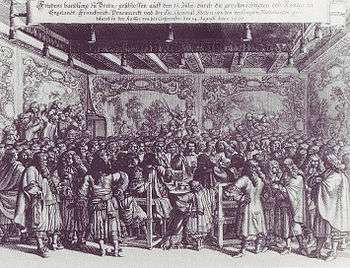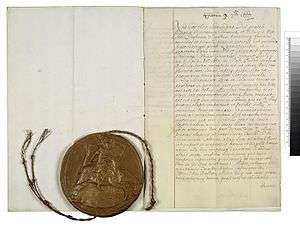Treaty of Breda (1667)


The Treaty of Breda was signed at the Dutch city of Breda, 31 July (Gregorian calendar), 1667, by England, the United Provinces (Netherlands), France, and Denmark–Norway. It brought a hasty end to the Second Anglo-Dutch War (1665–1667) in favour of the Dutch, as Louis XIV's forces began invading the Spanish Netherlands as part of the War of Devolution, but left many territorial disputes unresolved. It was thus a typical quick uti possidetis treaty. In the latter stages of the war, the Dutch had prevailed. Lieutenant-Admiral Michiel de Ruyter virtually controlled the seas around the south coast of England, following his successful Raid on the Medway, and his presence encouraged English commissioners to sue for peace quickly. Negotiations, which had been long protracted, and had actually begun in Breda before the raid, took only ten days to conclude after resumption of talks.
During the negotiations, the English commissioners (Denzil Holles and Henry Coventry) offered to return New Netherland in exchange for their sugar factories on the coast of Surinam, that had been taken by Abraham Crijnssen earlier in 1667. The Dutch side declined. In the East Indies, the Dutch secured a worldwide monopoly on nutmeg by forcing England to give up their claim on Run, the most remote of the Banda Islands. The Act of Navigation was moderated in that the Dutch were now allowed to ship German goods, if imported over the Rhine, to England.
As communications were slow, special dates were established for the different parts of the world, on which legal hostilities would end: 5 September for the English Channel and the North Sea, 5 October for the other European seas, 2 November for the African coast north of the equator and 24 April 1668 for the rest of the world.
In North America, Acadia was returned to France, without specifying what territories were actually involved on the ground. Thomas Temple, the proprietor, residing in Boston, had been given a charter by Cromwell, which was ignored in the Treaty, and the actual handing off was delayed at the site until 1670. In addition, the conquest of New Netherland by the English was confirmed on 21 July 1667, producing the Colonies of New York, New Jersey, Pennsylvania, and Delaware.[2][3]
In the Caribbean, the island of Saint Kitts was re-partitioned between English and French forces.
The most complete contemporary account of the war was published first in Dutch, then in French in 1668 as a Description exacte de tout ce qui s'est passé dans les guerres. It contains a list of Dutch vessels and goods lost in North America, an account of the 1664 capture of New Amsterdam (New York City today) with the articles of surrender to Governor Richard Nicolls, and Michiel de Ruyter's voyage to the West Indies. The Dutch commemorated the Treaty of Breda with a patriotic engraving.
The parties agreed to postpone a discussion of the pawnings of Orkney (1468) and Shetland (1469) until a future occasion. Such a discussion has yet to take place, leading some to argue that this constitutes a legal basis for regarding Orkney and Shetland as direct dependencies of the Scots crown, rather than parts of the UK.[4]
References
- ↑ Nationaal Archief, Archiefinventaris 1.01.02 inventarisnummer 12589.127, http://www.gahetna.nl/collectie/archief/inventaris/index/eadid/1.01.02/inventarisnr/12589.127/level/file
- ↑ Farnham, Mary Frances; Compiler. (1901–1902). Farnham Papers (1603–1688). Volumes 7 and 8 of Documentary History of the State of Maine. Portland, Maine: Collections of the Maine Historical Society, 2nd Series. pp. Vol. 7: 311, 314.
- ↑ Parry, Clive (Editor) (1969–1981). Consolidated Treaty Series; 231 Volumes. Dobbs Ferry, New York: Oceana Publications. pp. Vol. 10: 231.
- ↑ http://www.udallaw.com